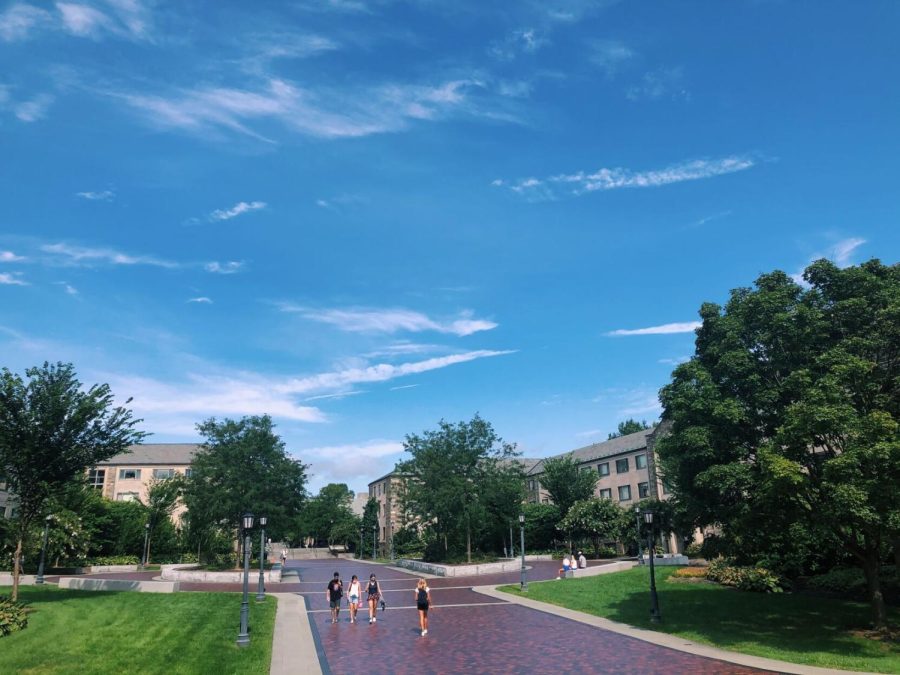Villanova Students Return to Campus Amid Global Coronavirus Pandemic
Students passing between classes during their first week back on campus.
August 26, 2020
After an almost six-month hiatus, filled with uncertainty, isolation and DIY-projects at home, Villanovans have finally been able to return to campus. Classes began both in-person and online on Monday, August 17 to mark the start of what has been consistently referred to as an “unprecedented semester” in the University’s history, yet becoming just another footnote in the ever-growing list of unprecedented events of 2020.
First-year students, of which 1,695 are currently enrolled (surpassing the University’s expectations of 1,675, according to University President Rev. Peter M. Donohue, O.S.A., Ph.D.), were able to begin this new chapter of their lives with Orientation, which began on Thursday, August 13, after a two-day move-in process. Returning upperclassmen began moving in on Friday, August 14, seeing friends they haven’t been able to see since all students were required to leave campus in March
Although it may feel like business as usual, students on campus are adjusting to the new regulations put in place by the University, in accordance with rules set by the Centers for Disease Control and Prevention and the Pennsylvania Department of Health.
The University established Community First: The CARITAS Commitment over the summer, as a pledge all returning students, faculty and staff were required to take. This all-encompassing pledge asked Villanovans to modify behaviors to ensure the health and safety of the community. The shared responsibility — to be considerate of others and to comply with health and safety requirements — is at the heart of the CARITAS Commitment.
Guided by principles to protect fellow peers and promote a safe environment for learning to continue, this semester has been reconstructed to include social distancing, wearing masks at all times, portable chairs and the vigilant disinfecting of high-touch surfaces around campus.
The University has provided all students with the previously mentioned portable chair, hand sanitizer, masks, disinfecting wipes and a thermometer, making it easier for all to abide by these guidelines and monitor their own symptoms on a daily basis.
Additionally, the 4,945 students living on campus, a small decrease from the 5,214 students on campus last year, have seen other changes around campus. Benches and tables have been marked off to appropriately sit people six feet away from each other, tents have been placed to allow for more outdoor seating, and plexiglass has been utilized in dining spaces.
The number of guests allowed in dorms at one time has become limited based on the number of residents, and only students from the University are allowed to visit other dorms.
Dining halls now also offer limited capacity seating. The food portion of Belle Air Terrace has been relocated to the Villanova Room in the Connelly Center, but the Belle Air itself is still open for student seating. Other places for food, like Freshens, are no longer open for the semester.
Reservations are required in order to work out at the Davis, Farley, Arch and Stanford fitness centers on campus. Additionally, reservations are needed to visit the University Bookstore. In regards to athletics, fall sports will not compete this semester. One consolation is that some select intramural sports will begin in September.
Even though the vast majority of Villanovans have been adhering to this new way of life, there have been instances of large gatherings of people that go against these regulations. Before the semester started, a gathering of a few hundred freshmen occurred on South Campus, and other large gatherings in dorms and at The Villas of Bryn Mawr have put the University on high-alert.
In an email sent on Friday, Aug. 21, University President Rev. Peter M. Donahue, O.S.A., Ph.D. addressed this issue and stressed that those who do not follow The CARITAS Commitment will pay serious consequences, such as being sent home early, as some students already have been.
He explained that even though less than 1% of the COVID-19 test results received in early August were positive (.41% to be exact), there is still work to be done in keeping the numbers down in order to keep everyone safe. It is up to students and faculty on campus to comply with The CARITAS Commitment, so that students at the University do not face a similar fate to students at UNC-Chapel Hill or Notre Dame.


